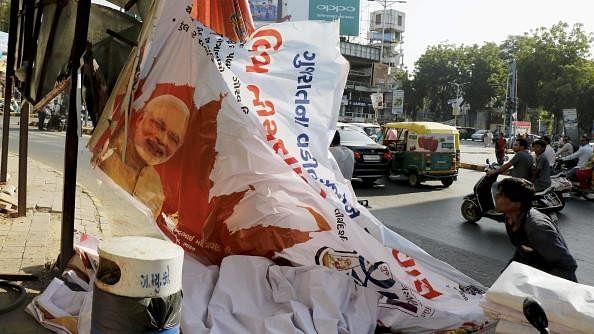
Model code of conduct in force in Gujarat.
Credit: PTI Photo
As the country braces for national elections, the Model Code of Conduct (MCC) has come into affect.
MCC comprises essential guidelines aimed at ensuring fair elections, developed through consensus among participating political parties. It relies heavily on the goodwill of parties and candidates to adhere to the ethical principles laid down.
However, there has been ongoing debate regarding whether the Election Commission of India (ECI) actually penalizes those who violate the MCC. It's important to note that these regulations don't operate within a strict legal framework, so penalizing parties or candidates doesn't carry significant weight.
The MCC isn't enforceable in court as a comprehensive rulebook with specified penalties. Typically, warnings from the CEC or the EC are the primary and final measures taken to address violations, often resulting in suspended complaints.
Nevertheless, certain aspects of the MCC can be legally enforced by invoking corresponding provisions in other laws such as the Indian Penal Code 1860, Code of Criminal Procedure 1973, and Representation of the People Act, 1951.
In 2013, the Standing Committee on Personnel, Public Grievances, Law and Justice proposed making the MCC legally binding, but this effort didn't materialize. Instead, the committee determined that most MCC provisions already find expression in other statutes mentioned earlier.
The ECI argues against formalizing the MCC into law, citing various constraints. Lengthy legal proceedings for violations could disrupt the electoral process, which typically lasts for 45 days and requires seamless execution within a set timeframe.
Under Article 324 of the Indian Constitution, the ECI has the authority to summon any party or candidate against whom a complaint has been lodged. All parties, whether ruling or contesting, are obligated to comply with these norms.
In case of suspected MCC violation, ECI issues notice to a party or candidate, either independently or in response to a complaint from another party or candidate. Upon receiving such notice, the party or candidate in question must respond in writing, either acknowledging fault and offering an apology or refuting the accusation. If the latter happens and they are found guilty afterwards, they may receive a written reprimand from the ECI, which many consider to be a mild punishment.
Additionally, the ECI may appoint a committee to assess the conduct of the accused party. However, the ECI lacks judicial authority to directly penalize violators.
To empower citizens in reporting political misconduct related to MCC violations, the EC introduced the C-vigil application on July 3, 2018. This platform allows citizens to submit complaints supported by evidence such as videos or photographs, which are then investigated by surveillance squads dispatched by the District Control Room in collaboration with local law enforcement.
Lok Sabha elections will be held in seven phases beginning April 19, and results will be announced on June 4.